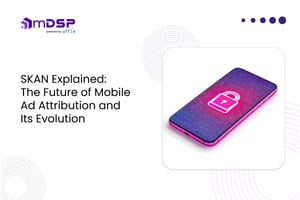SKAN Explained: The Future of Mobile Ad Attribution and Its Evolution

Achieving a balance between robust user privacy protection and effective ad campaign measurement has become paramount in today’s mobile advertising landscape. Apple’s SKAdNetwork (SKAN), announced in 2018, emerged as a unique framework designed to address these challenges head-on as the phone giant made changes to how apps track users. Since SKAN arrived on the scene, there has been much discourse on what this would mean for advertisers and where does one go from here as we move into a privacy-first era. As mobile marketers increasingly recognize the importance of privacy-first solutions, understanding and leveraging SKAN is crucial for staying competitive in the evolving digital landscape. According to a recent study, 76% of consumers are more likely to download apps that clearly state their privacy practices, underlining the significance of frameworks like SKAN in the current market.
What is SKAN?
SKAdNetwork (SKAN) is a privacy-centric framework by Apple that provides ad attribution for app installs and post-install events without compromising user privacy. Unlike traditional methods that tracked users across apps and websites, SKAN attributes app installs directly on the device. When a user clicks on an ad and installs an app, SKAN sends an anonymous, aggregated report back to the ad network.
How is it Different from IDFA?
The Identifier for Advertisers (IDFA) was the standard for ad attribution across iOS and Android devices, allowing advertisers to track users across different apps and websites. However, with privacy changes on iOS, Apple introduced changes in iOS 14.5, making IDFA usage dependent on explicit user consent via the App Tracking Transparency (ATT) framework.
To further enhance user data protection, Apple eventually introduced attribution within iOS SKAN. Unlike IDFA, SKAN doesn’t rely on user consent in the same way. It aggregates and anonymizes data, providing insights for advertisers to measure campaign performance without violating user privacy. This shift from user-level data to aggregate data is the fundamental difference between IDFA and SKAN.
Benefits for Advertisers
SKAN offers several advantages that make it an essential tool for modern mobile advertising:
- Enhanced Privacy Compliance: By adhering to Apple's stringent privacy standards, advertisers can avoid potential legal and regulatory pitfalls. This compliance builds a safer and more secure environment for both users and advertisers, reducing the risk of data breaches and privacy violations.
- Building User Trust and Transparency: Prioritizing user privacy helps in building trust among users. When users know their data is protected, they are more likely to engage with ads, install apps, and share positive feedback. This increased trust can lead to higher user retention and loyalty.
- Accurate and Reliable Attribution: Despite its aggregate data approach, SKAN provides reliable attribution data. Advertisers can still measure the effectiveness of their campaigns, understand user engagement, and make data-driven decisions to optimize their marketing strategies. This reliable attribution helps in maximizing return on ad spend (ROAS).
- Reduced Dependency on User-Level Data: With SKAN, advertisers can reduce their dependency on user-level data, which is becoming increasingly difficult to access due to global privacy regulations. SKAN's aggregate reporting allows for effective campaign measurement without compromising user privacy, aligning with GDPR and CCPA standards.
SKAN’s Future Developments
As we move through 2024, SKAN is set to see significant improvements that will enhance its functionality and usability for advertisers:
- Enhanced Conversion Values: More granular conversion values and improved postback mechanisms are expected. This will enable advertisers to gain more detailed insights into user behavior and campaign performance over time, allowing for better optimization and targeted advertising strategies.
- Advanced Privacy Features: Apple is expected to introduce new tiers of data granularity based on user anonymity. These advanced privacy features will help advertisers receive more useful data while maintaining strict privacy standards, ensuring a balance between data utility and user privacy.
- Web-to-App Attribution Expansion: Future updates are likely to expand web-to-app attribution capabilities to more browsers and platforms beyond Safari. This expansion will provide a more comprehensive view of cross-channel user journeys, helping advertisers understand the full scope of user interactions across different devices and platforms.
- Transition to AdAttributionKit: Apple announced AdAttributionKit at WWDC 2024, which is set to replace SKAN. AdAttributionKit will support multiple app stores and introduce features like re-engagement capabilities and multi-type creative support, providing advertisers with more versatile and powerful tools for their campaigns.
The Future of SKAN and AAK
SKAN represents a significant shift in mobile advertising, moving towards a privacy-focused approach to ad attribution. While the transition from IDFA to SKAN posed initial challenges, the benefits of enhanced privacy compliance, user trust, and reliable attribution data have become clear. The evolution of SKAN and the introduction of AAK signify Apple's ongoing commitment to advancing privacy-preserving technologies in the digital advertising space. As these frameworks continue to develop, advertisers can expect more sophisticated tools to measure campaign performance without compromising user privacy.
How mDSP Can Help
At mDSP, we help advertisers leverage SKAN and prepare for AdAttributionKit. Our advanced analytics, seamless integration, and user-friendly dashboards enable advertisers to gain actionable insights, optimize iOS campaigns, and achieve better results. Partner with us to stay ahead in the competitive mobile advertising space and thrive in the privacy-first era by making the most of SKAN's capabilities.

Want to know more about SKAN and navigating its intricacies? Download our comprehensive SKAN Glossary today to get the insights and guidance you need!


.png?width=352&name=image%20(6).png)
